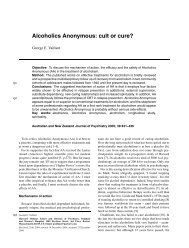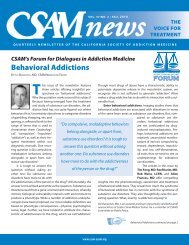SAN FRANCISCOMEDICINE - California Society of Addiction ...
SAN FRANCISCOMEDICINE - California Society of Addiction ...
SAN FRANCISCOMEDICINE - California Society of Addiction ...
You also want an ePaper? Increase the reach of your titles
YUMPU automatically turns print PDFs into web optimized ePapers that Google loves.
<strong>Addiction</strong> and Recovery<br />
Mainstreaming Mental Health<br />
Integrating Substance Abuse and Mental Health Treatment into Primary Care<br />
Robert M. McCarron, DO; Sergio Aguilar-Gaxiola, MD; and Caitlyn Meltvedt<br />
The primary care setting has been<br />
the de facto mental health care system<br />
in the United States for several<br />
decades. Up to 60% <strong>of</strong> all mental health<br />
care services, including substance abuse<br />
treatment, are delivered by primary care<br />
practitioners (PCPs). Nonpsychiatrists—<br />
mostly PCPs—prescribe more than 80%<br />
<strong>of</strong> antidepressants, now the most widely<br />
prescribed class <strong>of</strong> medications. 1 Primary<br />
care settings are also the first point <strong>of</strong><br />
contact and the treatment site <strong>of</strong> choice<br />
for minority, low-income patients. Primary<br />
care is more available and easier to access<br />
than specialty care, and many patients<br />
view substance abuse and mental health<br />
treatment in primary care settings as less<br />
stigmatizing than care received in specialty<br />
behavioral health settings.<br />
Although this is the case, PCPs <strong>of</strong>ten do<br />
not have time to address complex mental<br />
health and substance abuse-related issues.<br />
Moreover, even though depression, bipolar,<br />
anxiety, and substance abuse disorders are<br />
so prevalent in the primary care setting,<br />
PCPs generally have disproportionate and<br />
suboptimal residency and postresidency<br />
psychiatric training. Unfortunately, the end<br />
result for many who suffer from mental<br />
illness is either ineffective treatment or, in<br />
many cases, no treatment at all.<br />
Meanwhile, the delivery <strong>of</strong> preventive<br />
and primary care medicine to those<br />
who have severe mental illness (SMI) is<br />
also sorely lacking. In fact, those with SMI<br />
live, on average, twenty-five years less<br />
than those without SMI. 2 Although the<br />
main cause for this dramatic disparity is<br />
cardiovascular disease, people with mental<br />
illness are much more likely to suffer from<br />
chronic pulmonary disease, diabetes, sexually<br />
transmitted infections, certain common<br />
cancers, and sequelae related to substance<br />
dependence. 3<br />
In the eve <strong>of</strong> health care reform implementation,<br />
there has recently been a strong<br />
push by policy makers and clinic directors<br />
to redesign the primary care setting and<br />
more effectively integrate primary care and<br />
mental health care. This is a logical move,<br />
given the extraordinarily high prevalence<br />
<strong>of</strong> mental and substance abuse disorders<br />
and physical-mental comorbidities<br />
encountered in the primary care setting.<br />
The following is a brief summary <strong>of</strong> some<br />
statewide initiatives designed to improve<br />
the health <strong>of</strong> individuals with SMI and<br />
co-occurring chronic medical disorders<br />
through more effective partnerships<br />
between mental health and primary care<br />
providers.<br />
CalMEND Pilot-Collaborative<br />
to Integrate Primary Care and<br />
Mental Health Services (CPCI)<br />
This county-based program is sponsored<br />
by the State <strong>of</strong> <strong>California</strong> Departments<br />
<strong>of</strong> Health Care Services (DHCS) and<br />
Mental Health (DMH), and it is structured<br />
around the Institute for Health Care<br />
Improvement Breakthrough Series Collaborative<br />
model. The primary goal is to<br />
effectively bring together mental health and<br />
primary care practitioners and organizations<br />
that share a commitment to making<br />
major changes that produce significant and<br />
sustainable breakthrough results.<br />
CPCI will involve four to six county<br />
behavioral health authorities and their<br />
partner primary care organizations.<br />
Each pilot site will have direct access to<br />
faculty support and regularly scheduled<br />
CPCI sponsored “learning sessions” that<br />
are specifically designed to develop and<br />
expand integrative care models. During the<br />
eighteen-month project, various outcomes<br />
will be measured, including an assessment<br />
<strong>of</strong> how <strong>of</strong>ten standard-<strong>of</strong>-care primary<br />
preventive strategies are used (such as<br />
screening for diabetes and lipid abnormalities).<br />
In mid-2011, each CPCI pilot site will<br />
share its findings and achievements at a<br />
CalMEND Learning Forum, with the goal<br />
<strong>of</strong> improving medical and psychiatric care<br />
for those who have SMI.<br />
UC Davis: Integrated Medicine/<br />
Psychiatry Ambulatory Residency<br />
Training (IMPART)<br />
Recent research has shown that<br />
chronic physical conditions, including both<br />
common chronic physical diseases (diabetes,<br />
asthma, hypertension, heart disease,<br />
and so on) and chronic pain conditions<br />
(arthritis, back pain, headaches) are <strong>of</strong>ten<br />
accompanied by common psychiatric disorders<br />
such as major depression, anxiety<br />
disorders, and substance abuse. The fact<br />
that these psychiatric disorders <strong>of</strong>ten occur<br />
within the context <strong>of</strong> comorbid chronic<br />
physical conditions emphasizes the central<br />
role that providers <strong>of</strong> primary health care<br />
play in efforts to improve overall health<br />
outcomes <strong>of</strong> both physical and psychiatric<br />
disorders. Much <strong>of</strong> this co-occurring illness,<br />
however, is not diagnosed or treated. With<br />
Mental Health Services Act (MHSA) funding,<br />
the University <strong>of</strong> <strong>California</strong>, Davis, has<br />
developed and expanded two residency<br />
programs—internal medicine/psychiatry<br />
(IMP) and family medicine and psychiatry<br />
(FMP) —that specifically train physicians<br />
to better understand the mind-body connection<br />
and physical-mental comorbidities<br />
and to address this important health care<br />
disparity. 4,5<br />
16 17 San Francisco Medicine April June 2010 www.sfms.org













